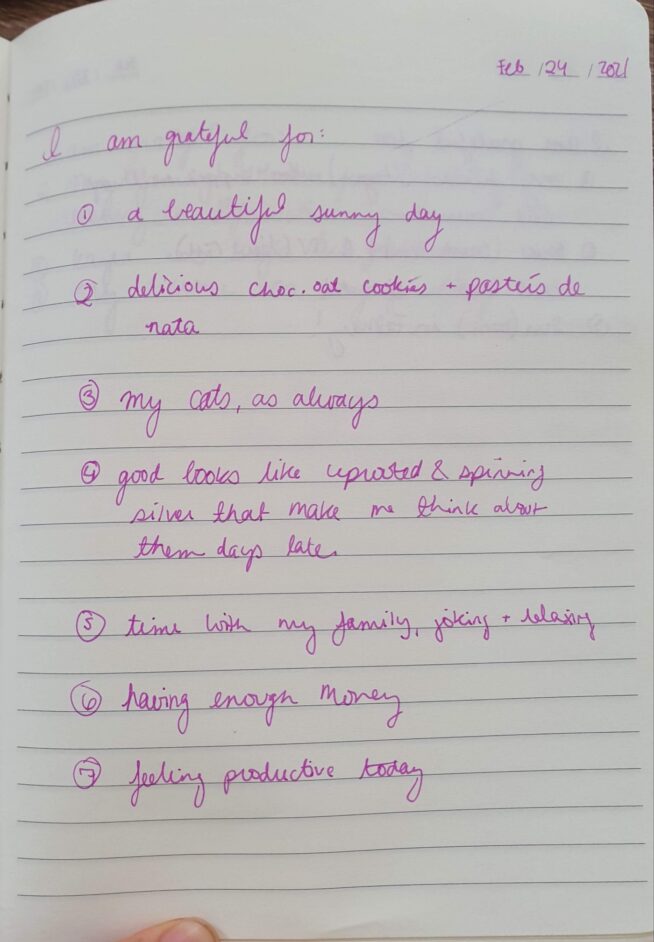I’d love to say that I’m one of those people who effortlessly journals 20 minutes a day. I’d love to claim that my daily diary habit fills me with gratitude, the opportunity to reflect, and a chance to become self-aware.
But that isn’t true. Rarely in my life have I been a regular journaler, and the few times I have, it didn’t bring the tremendous benefits it’s supposed to. I would write about all the things that went wrong or that annoyed me instead of reflecting and growing as a person.
Then, weeks, months, or even years later, I’d look back on my journal and read all these petty little problems that I’d completely forgotten about. Why on earth did I want to record that for posterity? I’d ask myself after reading how a coworker slighted me at the office kitchen in 2015.
I was only inspired to write when I was not in a positive mindset. This caused me to associate journaling with unhappiness, which naturally made it both hard to continue and hard to find benefits in doing so.
Both these problems — my inability to stick to journaling, and my lack of benefits from journaling — made me want to look for a solution. And I found it in a simple three-bullet gratitude journal.
My journal is a two-minute commitment.
The biggest problem I had with journaling was that I couldn’t do it. I’d keep it up for a couple of days, a week, maybe a month. And then it would grind to a halt.
From previous experience, I know that if I want to build a habit, I need to make the entry barrier as low as possible. So, when I decided to commit to journaling, I landed on two ways to streamline the habit:
- I’d make the requirement small.
- I’d make it convenient to write.
I committed to a minimum of three daily lines (though if I felt like adding more, I was of course allowed), and that it would be something I’d do right before falling asleep. This let me place my journal on my nightstand, ready to be filled out every night.
I’ve kept it up for about a month now, and I can attest that it’s very easy to manage.
My journal forces me to reflect on the positives.
All I ask of myself when I journal is to find three good things that happened that day and write them down.
I am blessed (or cursed, depending on how you look at it) with a pretty bad memory. If I want to remember something, I have to make a specific effort to do so. And because I’m prone to writing down bad things instead of good, it means that when I look back at my past years, I mostly remember sad memories.
I’ve lived an amazing life by any standard — I have incredible friends, I’m very happily married, my family is fantastic, I’ve traveled around Europe, I’ve lived in several different countries. When I have the power to control what lives on in my memory, why would I choose to remember the bad?
By deciding to make my journal a place filled with positives, I take back control of my memories. Now, when I flip back, I can remember the chocolate cake I baked, the tough-but-good workout I completed, the phone call I enjoyed with a friend.
My journal used to be a chore, and I was never motivated to do it because I didn’t reap any of the promised rewards. When I looked back at old journals, all I found was sad little complaints that I would have otherwise forgotten.
Now, my daily journal is simple to fill out and is a source of positive energy and happiness in my life — even if just the simple pleasures I enjoyed.
For anyone else struggling with a journaling mindset problem, I recommend you pivot to a three-bullet positivity journal and look for the good.

Zulie Rane is a reader and a writer who believes in the power to change the world through the written word. You can find her writing on ZulieRane.com, posting selfies and art on Instagram at @zulierane and tweeting bad puns on Twitter at @zulierane.
Image courtesy of Alina Vilchenko.












